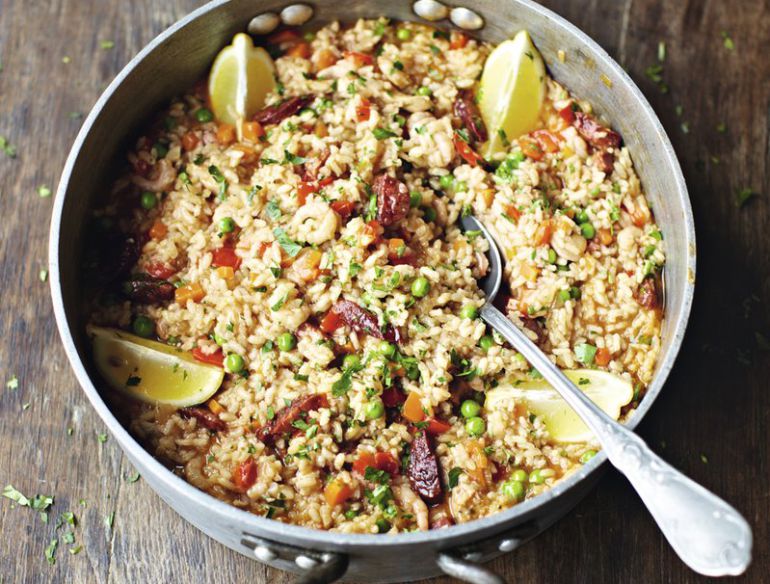
After Jamie Oliver became the latest high-profile chef to disgrace a culturally significant recipe, we take a look at some of the biggest botches of the last few years.
National dishes are treasured by their nations. What would the British culinary scene be without the local chippy, a home-cooked roast dinner, football ground pies, bakeries galore and chicken tikka masala?
Similarly, dishes such as spaghetti bolognese, coquilles saint-jacques and paella are held in high regard by Italy, France and Spain respectively.
But should we be allowed to alter such classics to suit our own tastes, or should the original recipe that made the dish famous go untouched?
This debate comes in the wake of a number of incidents involving high-profile chefs adding their own twists to traditional world dishes, notably Jamie Oliver, who probably won’t be paying a visit to Spain any time soon.
Paella is a dish that, to British knowledge, can be cooked with or without chorizo, depending on your personal liking for the meat. The Spanish, however, seem to see things quite differently.
Adding chorizo to paella may prove delicious for some, but it’s far from a traditional element - it’s not even considered a twist on the Valencian classic - instead, it’s actually its own dish: Arroz con cosas, or “rice with things”.
Comments range from peaceful through passive aggressive, all the way to threats of pain and suffering. The British Embassy in Spain have even had to get involved.
While we at Tibard don’t condone violence of any kind, you have to say that if you’re going to pass off Spanish rice as paella, Twitter will eviscerate you.
@jamieoliver pic.twitter.com/0rNsJkrS0x
— churreznos (@churreznos) October 4, 2016
Hola @jamieoliver eso no es paella es terrorismo, mejor hazte unos nuggets con los dedos de tu mano. @clau_infinity
— Kikolo (@kikolo777) October 4, 2016
.@jamieoliver this kind of chinese fried rice is food-terrorism if you call it paella.
— Pablo Tebe (@pablotebe) October 4, 2016
Fortunately for Jamie, top Spanish chef Omar Allibhoy has rushed to his aid, stating that his evolutionary style of cooking should be praised and he simply used the Paella name incorrectly.
This isn’t the first time a top chef has razzed off Spain by savaging a paella. Gordon Ramsey’s “How to Make Paella” video angered the comments section for its use of hot chili peppers and sherry wine.
John Torode’s take on the classic got some praise for the incorporation of beans, but his treatment of the rice lead to what would be dubbed as an “unappetising eyesore” of a dish.
Marco Pierre White drew the ire of Valencians by stating that the best paella he’d ever had was from northern Spain, which is blasphemous in itself. On top of this, his recipe uses “enough paprika to stop a moving train” and “more than a generous helping of white wine”.
Jamie himself has form when it comes to irritating entire nations by altering rice dishes. Two years ago, his recipe for Jollof rice was panned by West Africans for its use of whole vegetables in an incident dubbed “#Jollofgate”. While mainstream attention had been brought to the Ghanaian favourite, there was much concern as to whether the attention would be on Jamie’s version or the traditional - and correct - recipe.
Why limit the cultural appropriation to just rice? Pasta is also commonly spoiled by “overcooking”. Bolognese, for example, is supposed to be cooked without any herbs, cocoa, chocolate or any other ingredient you thought was part and parcel of a good spag-bol. Everywhere you go in the UK, Bolognese is garnished with oregano, basil, garlic and more. That’s fine, just don’t show it to an Italian; they serve their ragu alla bolognese over tagliatelle without herbs.
Last year, there was the French carbonara recipe that drew disgust from Italy. It involved boiled pancetta and farfalle pasta. In other words, it just wasn’t a carbonara. At all.
While it’s not necessarily the case that cultural appropriation is at fault for these slip ups, irritating nations of people is generally frowned upon. Chefs like to innovate with food, and that should always be encouraged, but maybe twists on famous dishes should be renamed as a new dish, if just to keep the world from slating you on Twitter.